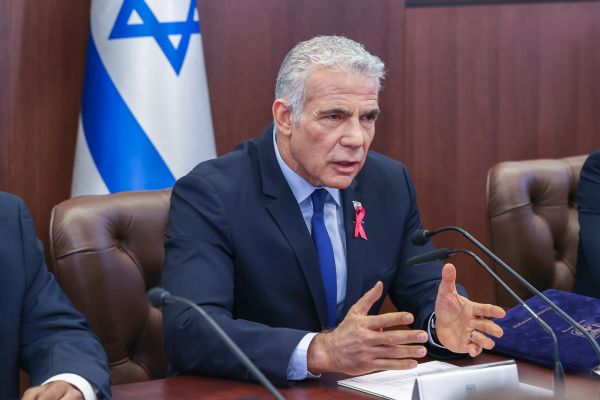
The petition calls for the suspension of negotiations with Lebanon pending Knesset approval.
By Debbie Reiss, World Israel News
The High Court of Justice on Monday ruled that the caretaker government headed by Prime Minister Yair Lapid must respond to a petition calling for a Knesset vote on an emerging maritime border deal with Lebanon.
The petition, filed by the Lavi organization for citizens’ rights, calls on the government to suspend negotiations with Lebanon – currently taking place via an American mediator – until the Knesset approves it.
According to the ruling, the Lapid government has until October 27 — four days before the general elections — to respond to the petition.
Opposition leader Benjamin Netanyahu said the deal was illegal because according to Israeli law, a national referendum must be held before the government gives up any of sovereign territory.
“[Lapid] did it without discussion in the Knesset and without a referendum. Lapid has no right to hand over territory and sovereign revenues to an enemy state,” he said.
However, Lapid argued that the deal is legitimate because it only concerns economic territory.
Hezbollah chief Hassan Nasrallah on Saturday hailed the deal, saying that Lebanon would be the ultimate decision-maker regarding the U.S.-drafted agreement.
Lapid said the proposal safeguards Israel’s security-diplomatic interests, as well as its economic interests.
“Money will flow into the state’s coffers and our energy independence will be secured. This deal strengthens Israel’s security and Israel’s economy,” he said at the start of the weekly cabinet meeting on Sunday.
“We do not oppose the development of an additional Lebanese gas field, from which we will of course receive the share we deserve. Such a field will weaken Lebanon’s dependence on Iran, restrain Hezbollah and promote regional stability,” he went on.
The deal would pave the way for the extraction and production of energy from the offshore Karish gas field, which has been the subject of a fierce disagreement over the two nations’ maritime borders.
However, critics in Israel and the U.S. have slammed the deal as surrendering to Hezbollah.
“Lapid shamefully surrendered to Nasrallah’s threats,” Netanyahu said. “He is giving Hezbollah sovereign territory of the State of Israel with a huge gas reservoir.”
Professor Eugene Kontorovich, director of international law at the Jerusalem-based Kohelet Policy Forum, told World Israel News that Lapid’s caretaker government was “engaging in a going out of business sale on sovereign Israeli territory.”
He slammed Israel for capitulating to the Biden administration’s whim and “thumbing their noses at Israeli constitutional law,” and went on to claim that Lapid was using the agreement to score points before November’s national election.
“The proposed natural gas agreement between Israel and Lebanon represents a total capitulation to Hezbollah, and a transfer of sovereign Israeli territory to an Iranian puppet state,” he said.
“As the people of Iran fight for their freedom, Israel is surrendering to Tehran via Beirut without even getting an acknowledgement of its existence in return, let alone peace,” he added.
Texas Senator Ted Cruz (R) accused the White House Sunday of pressuring Israel to give in to all of Lebanon’s demands.
“I am deeply troubled that Biden Officials pressured our Israeli allies to hand over their territory to the Iran-controlled terrorist group Hezbollah,” he tweeted. “Another topic for the next Republican Congress to investigate.”
Former president Donald Trump’s ambassador to Israel, David Friedman, tweeted Monday: “We spent years trying to broker a deal between Israel and Lebanon on the disputed maritime gas fields. Got very close with proposed splits of 55-60% for Lebanon and 45-40% for Israel. No one then imagined 100% to Lebanon and 0% to Israel. Would love to understand how we got here.”
After being proposed and rejected a decade ago, the deal is being rammed through, just weeks before the Israeli elections,” Kontorovich said, “because the Biden Administration and Hezbollah understand the desperation and weakness of the Lapid-Bennett government.”
Due to Lebanon’s refusal to recognize Israel, the two countries never agreed on a formal demarcation of their maritime borders. The issue had little significance until the discovery of valuable gas fields in the Eastern Mediterranean in recent years.
Israel has stated that Karish is entirely within Israeli waters, but Lebanon — which is currently suffering from an unprecedented economic crisis — claims that the gas field is partially located within its territorial waters.
The disagreement has sparked a longstanding dispute over which country has the right to authorize and profit from its gas production, which appears to be finally coming to an end.
Amos Hochstein, a former Special Envoy and Coordinator for International Energy Affairs to the American government, has been the mediator between Israel and Lebanon in a months-long attempt at shuttle diplomacy.